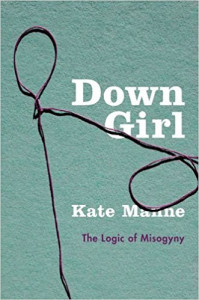

On today's show, host Mitch Jeserich is in conversation with Kate Manne, Assistant Professor of Philosophy at Cornell University, about her book Down Girl: The Logic of Misogyny. She addresses what is misogyny and how it manifest itself in today's society. In this context of awareness about sexual harassment that characterizes 2017, we focus on the dynamics behind sexism.
from the Guardian:
"Enter Kate Manne. A book about the hatred of women could always find its news peg, alas. But it is difficult to imagine a more timely moment for Down Girl: The Logic of Misogyny. Manne is a professor of philosophy at Cornell University, and she uses the abstract tools of her discipline to parse current events. Her guiding question is as troubling as it is straightforward – to quote the comedian John Oliver: “Why is misogyny still a thing?”
Manne challenges what she calls the “naive conception”, a tendency to treat it at an individual level, as a psychological characteristic of particular men. As she points out, this approach has many weaknesses, not least that it tangles up each case of misogyny in the problem of other minds. Did Elliot Rodger, the 22-year-old who shot 20 people in Isla Vista, California in 2014, and who announced he wanted to punish women for rejecting him, really hate women? Or did he simply have a mental illness? Does President Trump hate women? But look how much power he gives his daughter! And so on.
The “naive conception” also renders misogyny “politically marginal”. If the litmus test asks whether a given man hates all women, we will find very little misogyny in the world. Most men have mothers, sisters, daughters, wives. For once, Manne argues, we should put individual men to the side. Misogyny is “a social and political phenomenon with psychological, structural, and institutional manifestations”. And we should evaluate those manifestations from the perspectives of its victims. #NotAllMen? #YesAllWomen."

